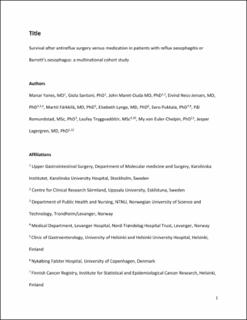| dc.description.abstract | Background
The aim was to examine the hypothesis that antireflux surgery with fundoplication improves long-term survival compared with antireflux medication in patients with reflux oesophagitis or Barrett’s oesophagus.
Method
Individuals aged between 18 and 70 years with reflux oesophagitis or Barrett’s oesophagus (intestinal metaplasia) documented from in-hospital and specialized outpatient care were selected from national patient registries in Denmark, Finland, Iceland, and Sweden from 1980 to 2014. The study investigated all-cause mortality and disease-specific mortality, comparing patients who had undergone open or laparoscopic antireflux surgery with fundoplication versus those using antireflux medication. Multivariable Cox regression analysis was used to estimate hazard ratios (HRs) with 95 per cent confidence intervals for all-cause mortality and disease-specific mortality, adjusted for sex, age, calendar period, country, and co-morbidity.
Results
Some 240 226 patients with reflux oesophagitis or Barrett’s oesophagus were included, of whom 33 904 (14.1 per cent) underwent antireflux surgery. The risk of all-cause mortality was lower after antireflux surgery than with use of medication (HR 0.61, 95 per cent c.i. 0.58 to 0.63), and lower after laparoscopic (HR 0.56, 0.52 to 0.60) than open (HR 0.80, 0.70 to 0.91) surgery. After antireflux surgery, mortality was decreased from cardiovascular disease (HR 0.58, 0.55 to 0.61), respiratory disease (HR 0.62, 0.57 to 0.66), laryngeal or pharyngeal cancer (HR 0.35, 0.19 to 0.65), and lung cancer (HR 0.67, 0.58 to 0.80), but not from oesophageal cancer (HR 1.05, 0.87 to 1.28), compared with medication, The decreased mortality rates generally remained over time.
Conclusion
In patients with reflux oesophagitis or Barrett’s oesophagus, antireflux surgery is associated with lower mortality from all causes, cardiovascular disease, respiratory disease, laryngeal or pharyngeal cancer, and lung cancer, but not from oesophageal cancer, compared with antireflux medication. | en_US |
